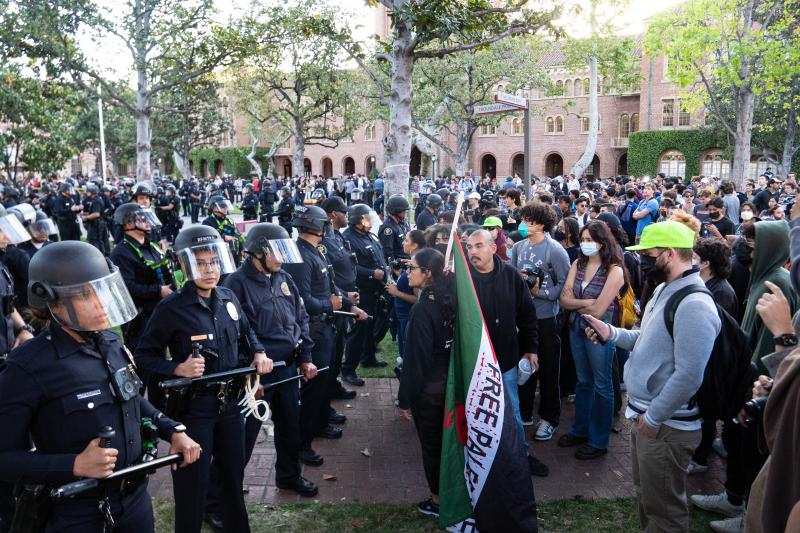At 4 a.m. on April 24, 2024, University of Southern California (USC) students took Alumni Park. By 11 a.m., the tents were up, and — just as quickly — the Department of Public Safety (DPS) started ripping them down. At 11:40 a.m., DPS made the first arrest, putting a student in a chokehold and placing a knee on his neck. Within 20 minutes, he was released by popular demand. By midday, LAPD officers were assembling in droves around campus. By 6 p.m., they circled the park and began making arrests, beating students, faculty, and community members with batons in the process. This continued for several more hours until 93 people had been arrested and the students’ occupation of the park cleared. Displaced, but not defeated. Students returned at noon the following day. On April 27th, they retook Alumni Park.
The student intifada at USC and the police brutality — or, to borrow a phrase from Mike Davis and Jon Wiener, “embarrassment of blue power” — unleashed to squash it are not a break with, but a continuation of USC’s relationship to policing in South Central. The university has historically sought to “protect” itself (and its bottom line) from the surrounding Black and Latinx community by buying up property, pricing out South Central residents, and policing its boundaries. During the Watts Uprising in 1965, tanks assembled to enforce USC’s perimeter, and someone on a frat house rooftop shot Black activist Levi Kingston. This week, on the 32nd anniversary of the 1992 Uprising against the beating of Rodney King and murder of Latasha Harlins, we should recall that USC is situated in one of the most brutally policed neighborhoods in the United States, even as the university goes to great lengths to insulate itself from that reality.

Just as USC’s student movement has identified the relationship between policing and displacement in South Central and Palestine in their demands, the late LA historian and political theorist Davis often explicitly connected policing in LA and Palestine. Davis highlighted the LAPD’s “West Bank” approach to policing gangs as being akin to Israel’s policing of the PLO. This relationship continues today in tangible ways: the LAPD loves to train in Israel, and USC’s own Erroll Southers — who heads USC DPS and currently serves as president of LA’s Police Commission — holds a “counterterrorism” fellowship in Herzliya, a Zionist settlement in Occupied Palestine.
The “Israelization” of LA that Davis wrote about in the 1990s extends beyond the militarized policing of the inner city. Indeed, Davis juxtaposed the Ulsterization of riot control in neighborhoods like South Central with the “‘Israelization’ of residential security in affluent hillsides and valley districts,” tying the deputized white vigilantism in these neighborhoods with Israeli settler violence against Palestinians. We see a reflection of this dual mode of policing the city today with the contrast between USC and UCLA: while USC sicced riot police on its own students resisting genocide, turning its militarized boundary inwards, the UCLA camp’s biggest threat has been Zionist agitators, who are allowed to terrorize students while the police watch on.
But stronger than the global network of violence is our deep history of shared struggle from LA to Palestine. During the 1992 uprising, Davis recalled that “there were some Palestinians down at City Hall the other night, and one of them turned to some of his American friends and said: ‘This is the beginning of your Intifada.’” An Egyptian journalist and activist heading to South Central to cover the uprising was told that that if he put a keffiyeh on his dashboard, “the brothers in South Central will know you’re cool!” The student intifada and their globalized demands continue the resistance to anti-Black, settler colonial containment, displacement, and policing that has shaped LA, Palestine, and everywhere in between. The LA intifada at USC is breaking the fortified walls between campus and community, always with Palestinian liberation at the forefront. The rebellion continues undeterred.
Source >> Institute for Palestine Studies
Art (47) Book Review (102) Books (106) Capitalism (64) China (74) Climate Emergency (97) Conservative Government (90) Conservative Party (45) COVID-19 (43) Economics (36) EcoSocialism (48) Elections (75) Europe (44) Fascism (52) Film (47) Film Review (60) France (66) Gaza (52) Imperialism (95) Israel (103) Italy (42) Keir Starmer (49) Labour Party (108) Long Read (38) Marxism (45) Palestine (133) pandemic (78) Protest (137) Russia (322) Solidarity (123) Statement (44) Trade Unionism (132) Ukraine (324) United States of America (120) War (349)

